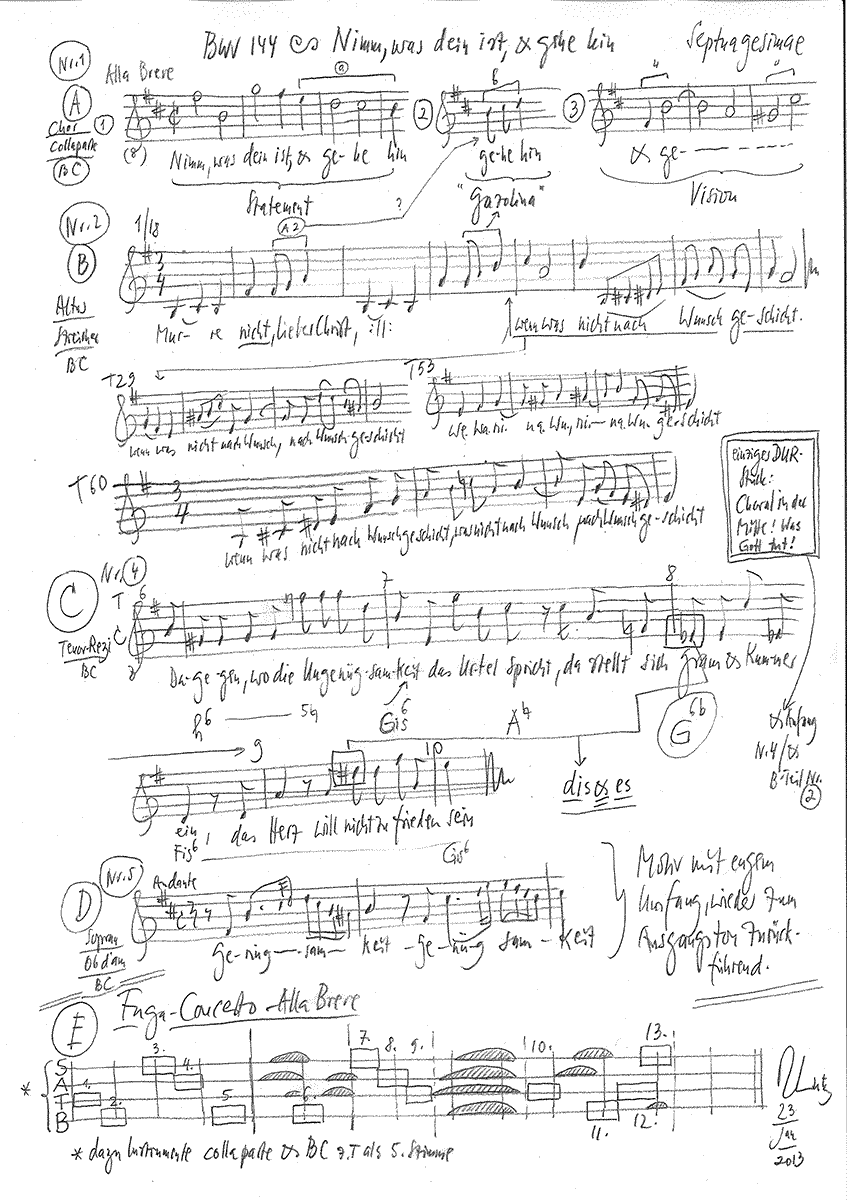Nimm, was dein ist, und gehe hin
BWV 144 // For Septuagesimae
(Take what is thine and go away) for soprano, alto and tenor, vocal ensemble, oboe I+II, bassoon, strings and continuo

Would you like to enjoy our videos ad-free? Subscribe to YouTube Premium now...
Workshop
Reflective lecture
Choir
Soprano
Lia Andres, Mirjam Berli, Guro Hjemli, Jennifer Rudin, Susanne Seitter
Alto
Jan Börner, Antonia Frey, Olivia Fündeling, Francisca Näf, Lea Scherer
Tenor
Clemens Flämig, Manuel Gerber, Raphael Höhn
Bass
Valentin Parli, Philippe Rayot, Tobias Wicky, William Wood
Orchestra
Conductor
Rudolf Lutz
Violin
Renate Steinmann, Monika Baer, Monika Altorfer, Yuko Ishikawa, Martin Korrodi, Marita Seeger
Viola
Susanna Hefti, Martina Zimmermann
Violoncello
Martin Zeller
Violone
Iris Finkbeiner
Oboe
Kerstin Kramp
Oboe d’amore
Ingo Müller
Bassoon
Susann Landert
Organ
Nicola Cumer
Musical director & conductor
Rudolf Lutz
Workshop
Participants
Karl Graf, Rudolf Lutz
Reflective lecture
Speaker
Gerhard Walter
Recording & editing
Recording date
01/25/2013
Recording location
Trogen
Sound engineer
Stefan Ritzenthaler
Director
Meinrad Keel
Production manager
Johannes Widmer
Production
GALLUS MEDIA AG, Switzerland
Producer
J.S. Bach Foundation of St. Gallen, Switzerland
Librettist
Text No. 1
Quote from Matthew 20:14
Text No. 3
Samuel Rodigast (1649–1708)
Text No. 6
Albrecht von Preussen (1490–1568)
Text No. 2, 4, 5
Poet unknown
First performance
Septuagesima Sunday,
6 February 1724
In-depth analysis
Composed in 1724, BWV 144 “Nimm, was dein ist, und gehe hin” (Take what is thine and go away) is inspired by the well-known parable of the workers in the vineyard. As in BWV 14, the opening movement is set as a motet, yet Bach could have hardly interpreted the formal concept of a vocal setting strictly accompanied by instrumental voices more differently than in these two works! Whereas “Wär Gott nicht mit uns diese Zeit” (Were God not with us all this time, BWV 14) portrays the gritty affect of a threatening situation, the introductory chorus of BWV 144 draws on the Bible dictum’s descriptive impulses to act, which are portrayed here as a gesture of offering-deeds. Indeed, already in 18th century publications, commentators lauded the skill with which Bach worked with contrasting motives to convey the inherent acceleration between the statuary opening “Nimm, was dein ist” (take what is yours) and the vivid imperative “Gehe hin, gehe hin, gehe hin” (go away, go away, go away).
After the opening movement (whose laconic efficiency is reminiscent of some turba choruses from Bach’s Passions), the restrained aura and reflective rhythm of the following alto aria introduce a sense of calm, despite the muted E minor key and recurring tremololike figures in the string parts. And in fact, the setting presents an admonishment not to “murren” (murmur) but to renounce selfish desires and bear one’s share, or cross, with patience. In this aria, both the length and the somewhat resigned tone bear witness to the difficulty in persuading old Adam to give up his destructive egotism in a spirit of insightful gratitude.
In this situation, the following chorale verse “Was Gott tut, das ist wohlgetan” (What God doth, that is rightly done) comes across as a deliberate intervention stemming from the crisis-tested voice of experience that, with a clear shift to the bright key of G major, fosters a sense of community and goodwill for new beginnings.
The tenor recitative then sings the praises of a well-understood “Genügsamkeit” (moderation), which is celebrated by a standard, regular cadence and contrasted with the harmonically aggrieved tones of discontent arising from harbouring excessive demands. Here, the manner in which Bach and his librettist evoke the opening motive of the preceding hymn verse “Was Gott tut, das ist wohlgetan” as a kind of lost melodic paradise gives potent expression to a powerful allusion.
Set in a moderate andante tempo and the key of B minor (a tonality otherwise reserved for expressing ardent striving for salvation), the soprano aria lauds that form of higher contentment that could also be interpreted as the fruit of truly knowing God and nothing short of a wise rule to live by. That an oboe d’amore sings its spectral song here is fitting with the aura of a setting that affirms this inspired restraint through its modest use of compositional means.
The closing chorale “Was mein Gott will, das g‘scheh allzeit” (What my God will, let be alway) reinforces this tendency to move beyond the self in a powerful cantional setting that transforms Albrecht von Brandenburg’s early hymn of consolation into a hopeful confession of faith for Bach’s era – and indeed all time.
Libretto
1. Chor
»Nimm, was dein ist, und gehe hin.«
2. Arie (Alt)
Murre nicht,
lieber Christ,
wenn was nicht nach Wunsch geschicht;
sondern sei mit dem zufrieden,
was dir dein Gott hat beschieden,
er weiß, was dir nützlich ist.
3. Choral
Was Gott tut, das ist wohl getan,
es bleibt gerecht sein Wille;
wie er fängt meine Sachen an,
will ich ihm halten stille.
Er ist mein Gott,
der in der Not
mich wohl weiß zu erhalten:
drum lass’ ich ihn nur walten.
4. Rezitativ (Tenor)
Wo die Genügsamkeit regiert
und überall das Ruder führt,
da ist der Mensch vergnügt
mit dem, wie es Gott fügt.
Dagegen, wo die Ungenügsamkeit das Urtel spricht,
da stellt sich Gram und Kummer ein,
das Herz will nicht zufrieden sein,
und man gedenket nicht daran:
Was Gott tut, das ist wohlgetan.
5. Arie (Sopran)
Genügsamkeit
ist ein Schatz in diesem Leben,
welcher kann Vergnügung geben
in der größten Traurigkeit,
Genügsamkeit.
Denn es lässet sich in allen
Gottes Fügung wohl gefallen
Genügsamkeit.
6. Choral
Was mein Gott will, das gscheh allzeit,
sein Will, der ist der beste.
Zu helfen den’n er ist bereit,
die an ihn gläuben feste.
Er hilft aus Not, der fromme Gott,
und züchtiget mit Maßen.
Wer Gott vertraut, fest auf ihn baut,
den will er nicht verlassen.



